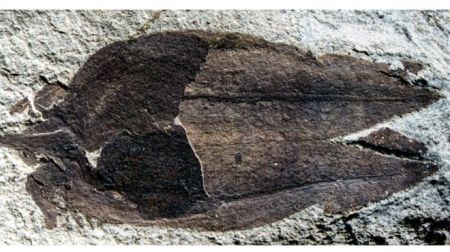52 Million Year Old Fossilized Fruits with Intact Skin Discovered in Argentina
Remarkably well-preserved fossilized fruits dating back 52 million years have been discovered in a volcanic lake in Patagonia, Argentina.

The fossils were identified to be a kind of berry closely related to ground cherries (or Physalis) -- a type of lantern fruit belonging to the Solanaceae (or nightshades) family of flowering plants. The Solanaceae family of plants, which includes tomatoes, potatoes, peppers, and tobacco, holds exceptional economic and cultural importance in today's world.
The discovery of the fossilized fruits sheds new light on the origins of the plant family they belong to. Scientists earlier believed the diversification of the nightshade family to have occurred in South America during its separation from the Gondwana supercontinent some 30 million years ago. However, spare fossil records prevented researchers from ascertaining this theory.
With the discovery of the new 52 million-year-old fossilized berries, the study, published in the journal Science, finds that the Solanaceae were well diversified long before the final Gondwanan breakup. The researchers involved with the study believe the two fossils to be from a late-evolving branch of the family dating back to when South America was adjacent to Antarctica before the supercontinent's breakup.
The discovery of the fossils preserved in amazing condition -- with an intact outer skin and the berry still visible inside the fruit -- is completely unprecedented.
"These are the only fossil fruits ever found of this whole group of plants, that now has over 2,000 species," study author Peter Wilf, a professor of geosciences at Pennsylvania State University, told BBC News.
"Here we have this discovery of these incredibly rare, delicate fossils - here you have a berry surrounded by this papery calyx - it's almost unheard of that such a thing could be fossilized," he added.
The two fruits were found at the Laguna del Junco, a volcanic lake in Argentina which is an abundant source of fossils.
Scientists attribute the impeccable preservation of the fossils to the acidic quality of the lake's water which would have prevented any biological breakdown of the fruits by microbes. The fruits are also believed to have drifted gently into the lake where they were slowly covered by layers of sediment resulting in them being pressed flat, reports IBTimes UK.
The researchers now intend to find more fossilized fruits such as these, both in Argentina as well as in Antarctica. Their aim is to trace the plant family's lineage further back and reshape the traditional views on the origin and evolution of the plant kingdom.





















